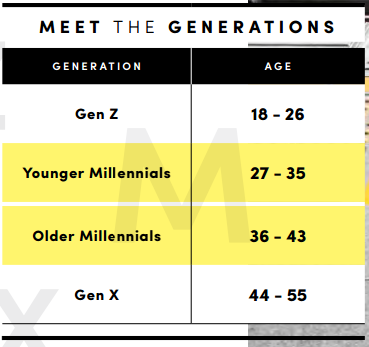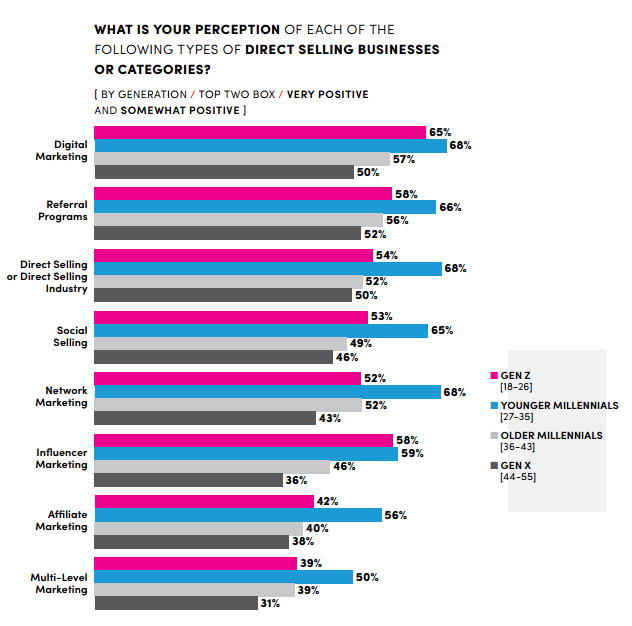Actionable insights and opportunities from the first-ever direct selling generational engagement study.
Direct selling has become an increasingly popular avenue for individuals to start their own businesses and earn income. To gain a comprehensive understanding of the perceptions surrounding direct selling, the Direct Sales Generational Engagement Study was conducted by Bridgehead Collective and carried out by The Center for Generational Kinetics, led by President Jason Dorsey.

In this first-of-its-kind study, Bridgehead Collective chose to partner with the Center for Generational Kinetics, which has led more than 100 research studies in all major industries. Their seminal annual study, The State of Gen Z, formed the basis for the best-selling book, ZConomy and has been consistently featured in national and global media including The Wall Street Journal, New York Times, CNN and many more.
I set out to discover America’s perceptions of entrepreneurship, the gig-economy and—more pointedly—direct selling. Statistical significance was of ultimate importance in this analysis, so the study represents a wide-sweeping sample that is reflective of America, with an equitable mix of genders, demographics, employment status, education levels and location that allows for a 97 percent confidence level. This study aimed to explore the attitudes, motivations, limitations and beliefs about starting a business in America, as well as uncover perceptions of direct selling, recruiting strategies, onboarding methods, distributor retention and preferred payment structures.

We designed the study to provide actionable insights across 10 key categories:
- Perception of Industry and Channel
- Recruiting and Prospecting
- Motivations and Decision Criteria
- Onboarding and Getting Started
- Training
- Compensation and Value Proposition
- Recognition
- Incentive Trips and Events
- Retention
- Duplication and Role of Team Building
In this series, we will be digging deeper into each of these categories, starting right now with Perception of Industry and Channel.
The good news (and alternative title for this article) is “They Don’t Hate Us.”
I say that somewhat tongue-in-cheek given what have felt like pretty significant headwinds on our category, industry, who we are and even what we call ourselves. The data tells a different story. But before we get into that, let’s just review what the study showed about starting a business in general.
Perceptions Around Starting a Business
The study revealed that half of Americans expressed interest in starting their own businesses within the next five years. Younger Millennials, in particular, showed a significantly higher likelihood (63%) of pursuing entrepreneurship. Men were also more inclined (59%) compared to women (41%), and individuals with a graduate degree showed the highest likelihood (71%) of venturing into entrepreneurship. Furthermore, 76% of Americans expressed a desire to own their own business within the next three years, with younger Millennials exhibiting the highest aspiration rate (83%).

That’s a lot of potential new people interested in doing what we do. But what kind of business? Interestingly, approximately 42 percent of Americans reported having considered working in the direct selling industry. Notably, Gen Z (18-26) and younger Millennials (27-35) displayed a greater inclination towards direct selling, both in terms of considering it as a career option and actively working within the industry.
WOW STAT: 60% of Americans think owning their own business is harder than being an employee at a business.
But what about direct selling? We have long heard about the negative perception this channel has, particularly among the next generation of direct sellers.
Again (sensing a theme here?) the data tells a different story. But in an industry that has been playing the “name game” for quite some time (direct selling, social selling, digital selling, affiliate marketing, referral marketing, social marketing and on and on), so we decided to test them all! Which of these, if any, had a negative perception and which did not.

Americans have the most positive perception of:
- Digital Marketing (60%)
- Referral Marketing (58%)
- Direct Selling or Direct Selling Industry (55%)
Did you see that….55+ percent of all Americans have a Positive or Very Positive perception of Direct Selling. The only category of business that scored less than 50 percent positive was Multi-Level Marketing, but we can’t really pretend to be surprised by that, can we?
This is great news, everyone. That means that we don’t have as much resistance to the very language that describes what we do as we may have thought.
Where it really gets interesting is when you break it down by generation. Younger generations, especially younger Millennials, have a significantly more positive perception of all direct selling businesses or categories tested compared to older generations.
And look at those Younger Millennials—across the board—significantly more positive than any other generation about our industry. No matter what we call it.
So, ultimately what does this mean? Words matter. Precise positioning of our opportunity, using language that resonates based on the specific and targeted generation you are trying to attract can radically improve the effectiveness of your messaging and your results.
Next month we will explore the ever-critical world of Recruiting and Prospecting and learn how each generation wants to hear about your business opportunity: in what setting, with what technology and using what words!
Spoiler alert: Digital is not the all-powerful solution we tend to think it is with the younger generations!
Words That Resonate
The Direct Sales Generational Engagement Study—conducted by Bridgehead Collective—shed light on the perceptions of direct selling across different generations. It revealed varying levels of interest and motivations among different age groups; highlighted effective recruiting strategies; emphasized the importance of onboarding and retention strategies; and explored the significance of community in fostering success as a direct selling distributor.

By understanding these generational perspectives—and using the information to precisely position all facets of your business—you can tailor your approaches to attract, engage and retain distributors effectively.

With 20+ years of cross-functional experience in direct selling, Heather Chastain brings a solid understanding of sales, marketing, technology, manufacturing, operations and C-Suite challenges as well as a strong collaborative and relational style of leadership to the table. Heather has held executive roles at Shaklee, Arbonne International, Celebrating Home and BeautiControl. Heather also serves as the Strategic Advisor at DSN and is the Founder & Chief Executive Officer of Bridgehead Collective.
From the July/August 2023 issue of Direct Selling News magazine.


